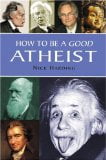 How to Be a Good Atheist
How to Be a Good Atheist
by Nick Harding
Oldcastle Books, £10.00, ISBN 978-1-8423-237-2
The title of Nick Harding’s book How to Be a Good Atheist, could mean morally good or effective. What is offered covers what ‘atheism’ means, a brief history of it, a justification, and an attack on religion. It is a short (160 pages) addition to the current spate of anti-religious books by Dawkins, Dennett, Hitchens, etc. It is very clear and readable, though there are some stylistic and grammatical slips.
He seems to agree with the view of some writers, that there are five subsets of atheism: dogmatic, sceptical, critical, philosophical and speculative. I would rather see a spectrum, ranging from mere absence of belief in God or gods, to either a denial of their existence, or the view that since there is neither evidence nor logical argument in favour, and rather good reasons against, a negative result is the only tenable conclusion. There is a chapter on “What is wrong with religion?” – essentially, that it relies on faith – although Harding points out that some religions have no gods. His history of atheism is clear if necessarily very condensed. There is a spirited defence of atheism against the usual silly attacks, e.g. it is just another faith, lots of bad people like Hitler have been atheists (he wasn’t, and in any case it is irrelevant), atheists cannot be moral, if we lose religion we lose all our finer qualities, love, art, music, etc., we all “really” believe in God but atheists won’t admit it, and so on.
The book ends with some famous atheists, a glossary, and twenty-odd ‘must-have’ books for atheists, inevitably leaving out= many favourites. A short list of useful addresses sadly omits The Freethinker (“the voice of atheism since 1881”). It’s often a pugnacious book, throwing punches in all directions, but a lot of them score. It ought to be in every secondary school. Fat chance.



